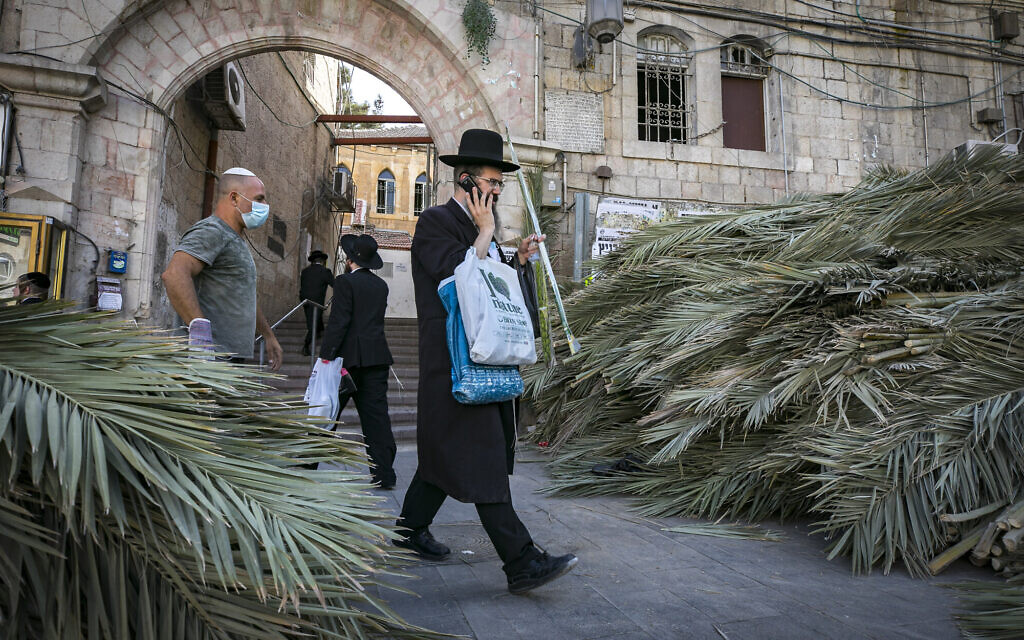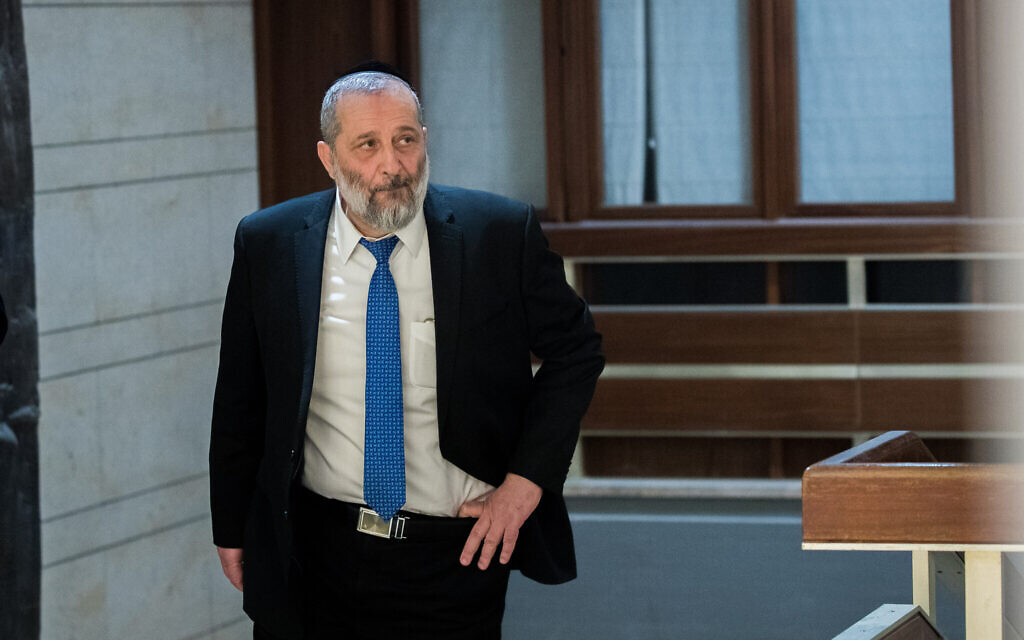The Health Ministry on Thursday issued a complex set of regulations relating to the spread of the coronavirus during the Sukkot holiday, which begins on Friday evening, including allowing some crowding in the huts traditionally erected during the festival.
One rule, reportedly worked out between United Torah Judaism MK Ya’akov Asher and the ministry, designates sukkas that are “50 percent open” as outdoor spaces, in which up to 20 people are allowed to gather. This provision was castigated by the Israeli Association of Public Health Physicians Thursday, with TV commentators Thursday night asserting that it makes a mockery of an earlier regulation restricting the use of a sukkah to members of the family that owns it, with the threat of fines for violators.
Complicating matters further, another ultra-Orthodox politician, Interior Minister Aryeh Deri, said in TV interviews that the new rule allows up to 20 people to pray in a “50 percent open” sukka, but not to sit, eat or sleep in it. It was also not clear what would meet the “50 percent open” designation.
The news of this complex new provision came amid a growing crisis among Israel’s ultra-Orthodox, or Haredim, who account for a disproportionate portion of Israel’s disastrous infection rate — some 40% of new cases, according to figures released Thursday, from a population that is some 10% of the Israeli demographic. Criticism of the Haredim is growing, with widespread reports saying some are disregarding lockdown restrictions during the High Holiday season, including by continuing to host mass gatherings. TV reports have shown numerous large sukkahs, capable of holding hundreds of people, being constructed in Jerusalem’s ultra-Orthodox Mea Shearim neighborhood; Sukkot starts on Friday evening.
Ultra-Orthodox communities have been among the hardest-hit by the virus in Israel, with many ultra-Orthodox cities leading the way in new daily infections.
Related: Is ultra-Orthodox ideological disobedience fueling Israel’s soaring virus rate?
Israel is under a nationwide lockdown as its second wave outbreak spirals out of control. Health authorities fear holiday gatherings will further spread the virus. Current regulations limit indoor gatherings to 10 people, and outdoor gatherings to 20, including for prayers and protests.
During the weeklong Sukkot holiday, many religious Jews eat meals and sleep in sukkahs that are purpose-built for the holiday outside the home. They are usually primitive booths that are at least partially open to the outdoors, with porous roofs made from plant materials and openings for doors and windows.
Many ultra-Orthodox sects build large sukkahs to host communal meals and other celebrations, some of which can hold thousands of people.

People wear face masks at the Mahane Yehuda market in Jerusalem on September 30, 2020, during a nationwide lockdown to prevent the spread of COVID-19. (Olivier Fitoussi/Flash90)
Health officials ruled on Thursday that if a sukkah is at least 50 percent open, either by way of its roof or walls, it can be considered an open area, and host up to 20 people. However, people from different households will still be forbidden from staying in the same sukkah.
When inside sukkahs, which are generally small, bedroom-sized enclosures, people will still be required to maintain a distance of two meters, the network said.
Israelis are also forbidden from hosting non-nuclear family members in their homes during the holiday.
The government has repeatedly come under fire for issuing confusing, contradictory and shifting guidelines to the public in its efforts to turn the tide against the pandemic.
Current regulations forbid Israelis from traveling over one kilometer from home, including for visits to older adults, who are considered an at-risk population. It is permissible for people to go to their parents’ home to help them construct a sukkah, however, as well as bring them food and medicine.
A police official told Channel 12 on Thursday that law enforcement will not be able to dismantle all sukkahs that violate guidelines, and that responsibility to comply with the regulations rests with the public.
Police have said that while they do not intend to go into private sukkahs and check for violators, they will have zero tolerance for massive sukkahs meant to contain large groups of people.

Ultra-Orthodox Jews buy palm branches for the upcoming holiday of Sukkot in Jerusalem’s Mea Shearim neighborhood on September 30, 2020. (Olivier Fitoussi/Flash90)
Ministers have approved fines of NIS 500 ($145) for anyone caught in a sukkah not their own. It was not immediately clear if the owner of the sukkah would also be fined, or how the rule will affect communal sukkahs.
The ban on visiting another person’s sukkah will remain in force for two days after the festival ends.
The Israeli Association of Public Health Physicians warned the Health Ministry on Thursday not to approve the loophole to allow gatherings of up to 20 people in half-open sukkahs, Army Radio reported.
The crisis in the ultra-Orthodox communities is a major concern for health officials, who ascribe the heavily over-representation of ultra-Orthodox Jews among new infections in Israel to holiday gatherings, crowding in yeshiva educational institutions, and dense living conditions.
A growing number of reports also said many ultra-Orthodox people were disregarding lockdown regulations.
Channel 13 reported Thursday night that the lockdown has sparked a rebellion in parts of the community, with some planning to continue holiday celebrations as normal, and that the ultra-Orthodox neighborhood of Mea Shearim features dozens of large sukkahs built for hundreds of people.
One Mea Shearim resident told Channel 12, “Whoever lives here will pray in synagogues as usual, but only people from the area, not those from outside. However, most people here already got sick and recovered, so it’s not clear why we’re not allowed to congregate. Law enforcement isn’t scary. We’ll pay the NIS 50,000 fine and that’s it.”
In addition, a large market for the sale of the four species used during the holiday was set up in Jerusalem’s Geula neighborhood Wednesday, according to the Yedioth Ahronoth daily. Such markets, usually a normal sight ahead of the holiday, have been banned this year by the government.
Rabbi Moshe Sternbuch, the head of the rabbinical courts of the anti-Zionist Edah Haredit community, said on Thursday in a message to followers, “Do not fear authorities, and synagogues must be kept open. Do not fear arrest, on the contrary, I’m ready to be arrested,” according to the Kan public broadcaster.
Health Ministry Director-General Chezy Levy has warned that some fringe groups among the ultra-Orthodox are seeking to deliberately get infected with the coronavirus in a bid to create “herd immunity” in their communities, according to Channel 12.
“This is not our health doctrine and we aren’t adopting herd immunity, with the infections and deaths that it entails. I am very pained by this behavior, and this a moment of truth for advocacy and for the leadership of the community,” Levy was quoted as saying.
Deri, the interior minister, who heads the ultra-Orthodox Shas party, claimed on Thursday that the Haredi community was following the virus rules more strictly than the general population.

Interior Minister Aryeh Deri, at the Knesset in Jerusalem, on March 3, 2020. (Yonatan Sindel/Flash90)
“The vast majority of the ultra-Orthodox are observing the rules, far more than the general public. There is no other community that is this disciplined,” he told Channel 12.
“If I am at fault it is for failing to convince [the public] that the Haredim are keeping the rules. They are doing an injustice against the Hasidim,” he added, noting the Gur Hasidic sect, the country’s largest, has closed its synagogues amid a wide outbreak.
Earlier Thursday, a campaign poster shared on social media by the left-wing Meretz party accused ultra-Orthodox politicians of having “blood on their hands.” It was deleted a short while later.
The poster, which featured images of Deri and United Torah Judaism leader Yaakov Litzman, was meant to be a criticism of their coronavirus policies.
The poster was condemned by opposition leader Yair Lapid, who called it “unbearable and illegitimate.”
“This is not what the State of Israel and the people of Israel need. I strongly condemn this statement. This is not how we’ll get out of the crisis,” Lapid tweeted. Deri praised Lapid for his condemnation of the image.
The government’s COVID-19 czar, Ronni Gamzu, reportedly told ministers during Wednesday’s coronavirus cabinet meeting that ultra-Orthodox Israelis are 2.5 times more likely than the general public to test positive for the coronavirus.
Levy, the Health Ministry director, told reporters on Wednesday that 34% of those diagnosed with the virus in Israel were ultra-Orthodox, though the community constitutes only approximately 12% of the population. Gamzu said Thursday that 40% of recent cases were ultra-Orthodox.
After a massive spike in coronavirus cases, Israel on September 18 entered its second national lockdown, which has seen most shops and businesses shuttered and most Israelis confined within a one-kilometer (0.6-mile) radius of their homes except for essentials like food and medicines.
The lockdown, which was supposed to end on October 11, will now remain in force until October 14, ministers decided Wednesday night.
The Health Ministry said Thursday night that 9,015 new coronavirus cases had been confirmed the previous day, with almost 70,000 tests conducted. It was the first time the number of daily cases surpassed 9,000, though some of the cases are said to be part of a backlog from Yom Kippur, when most testing was halted and labs were closed.
The death toll climbed to 1,622, with 70 deaths since the previous evening.
Related posts:
Views: 0
 RSS Feed
RSS Feed

















 October 2nd, 2020
October 2nd, 2020  Awake Goy
Awake Goy  Posted in
Posted in  Tags:
Tags: 
















